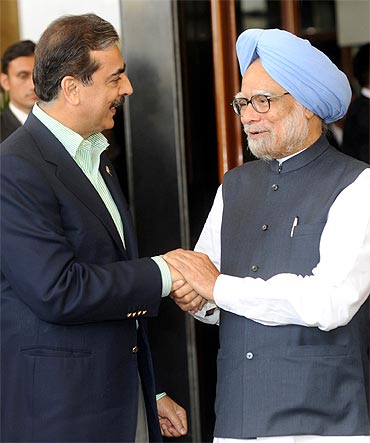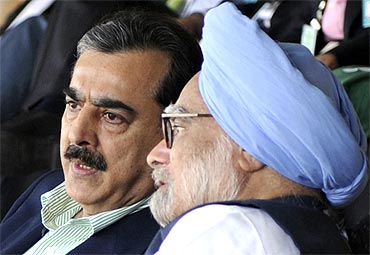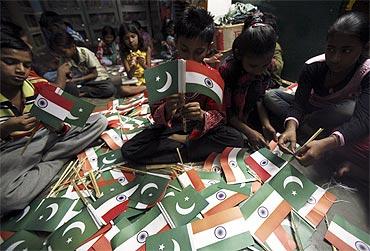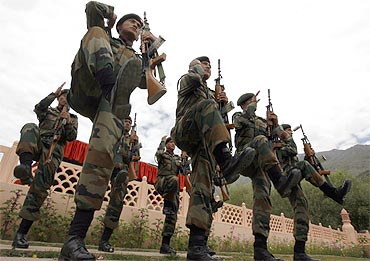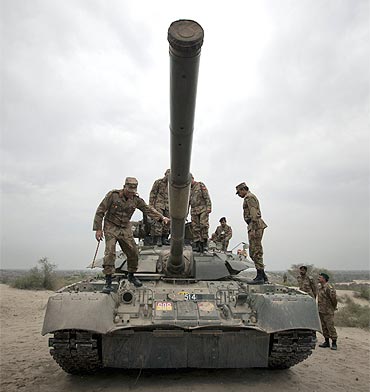 | « Back to article | Print this article |
India, Pak should refrain from tit-for-tat tactics
Calibrated acceleration of the re-engagement process under the supervision of the two prime ministers is the need of the hour, says B Raman
If the forward momentum imparted to the India-Pakistan re-engagement process by Prime Ministers Manmohan Singh and Yusuf Raza Gilani during their wide-ranging conversations at Mohali on March 30 is not to be stalled once again, it is important for the agencies of the two countries responsible for counter-intelligence to re-examine their ground rules for CI operations in order to avoid tit-for-tat operations of the kind reported from Chandigarh and Islamabad, even as the two PMs were holding their 'conversations not amounting to talks'.
If the intelligence reflexes in the two countries continue to be as before, they could assume an uncontrollable course, ultimately resulting in the dissipation of the feel-good atmosphere generated by the two PMs.
The brief facts of the two incidents as reported by the media are as follows. On the evening of March 30, a driver from the Pakistani high commission in New Delhi was detained at Chandigarh after he was allegedly seen near the Cantonment area. He was released after questioning.
The two governments tried to avoid unnecessary rhetoric
The reports do not say who detained him -- the local police or the Intelligence Bureau -- and how long he was detained. He had apparently sustained some bruises. According to Indian official sources, he sustained the bruises when he fell down while trying to escape.
Just hours after the Chandigarh incident, a member of the staff in the Indian high commission in Islamabad was reported 'missing'. He was released subsequently after Foreign Secretary Nirupama Rao took up the matter with her Pakistani counterpart Salman Bashir. The two governments have tried to avoid unnecessary rhetoric and over-reaction after the two incidents.
More than the two incidents, what worries me is that a campaign to ridicule the PM's initiative, which set in motion the de-escalation process, and those who endorsed it has already started on the Internet by those who feel uncomfortable with the idea of 're-engaging' and 're-connecting' with Pakistan.
Mohali initiative shouldn't be a non-starter
The futility of any dialogue or re-engagement with Pakistan is the overriding theme of these post-Mohali comments in the wake of these two incidents.
If we have to keep moving forward, it is important for the two prime ministers to initiate immediate action to prevent any more such incidents. Otherwise, the positive vibes created by them at Mohali could go the way of all previous initiatives -- non-starters ridiculed, maligned and forgotten.
Our PM should immediately discuss with intelligence agencies chiefs their existing ground rules for CI operations to ensure that over-enthusiasm or the propensity for tit-for-tat operations do not unwittingly derail the re-engagement process at its very start.
We need a formal relationship between intelligence agencies
Our intelligence agencies have to do their job of protecting us from Pakistan-sponsored terrorism and preventing Pakistani agencies from collecting sensitive intelligence in our territory.
Are there more sophisticated and less provocative ways of doing this, keeping in tune with the de-escalatory process initiated at Mohali? This is a question that needs to be discussed at the highest level.
The establishment of a formal liaison relationship between the intelligence communities of the two countries is an important step that should not be delayed further. I have written and spoken about this in the past and I stress once again the advisability of this course of action.
We need a military-to-military relationship
Let the chiefs of the intelligence agencies of the two countries meet immediately to discuss freely and frankly what happened at Chandigarh and Islamabad. They should come to a gentlemen's understanding of mutually accepted dos and don'ts in CI operations.
Another question that needs to be discussed in New Delhi is how to keep the armies of the two countries associated with the re-engagement process.
How to prevent a Kargil-type surprise behind our back as we keep looking ahead of us? It is time for us to identify the various initiatives that the Indian Army can take to have a less confrontational military-to-military relationship with the Pakistani Army.
We should invite Pakistan army chief
Two possible initiatives that come to my mind are an invitation to General Ashfaq Pervez Kayani, Pakistan's chief of the army staff, to pay an official visit to India and exchanges of visits by senior military officers of the two countries.
We already have such exchanges with the Chinese Army. We are none the worse for it. There is no reason why we should not have such exchanges with the Pakistan Army.
In the case of China, its People's Liberation Army welcomed such exchanges. The Chinese political leadership, therefore, had no difficulty in agreeing to them.
In Pakistan, the army's hostility and suspicion about India are so strong that there is likely to be strong opposition from Kayani himself. In view of his opposition, Pakistan's political leadership may not be able to take any decision in the matter.
Sonia Gandhi can visit Pakistan
But we must keep pressing on General Kayani -- directly as well as through the United States -- the need to set in motion such exchanges.
The decision taken by Dr Singh and Gilani to establish Parliament-to-Parliament relationship must be implemented quickly.
It has been reported that Gilani has invited both our PM and Congress president Sonia Gandhi.
Even if a decision on a prime ministerial visit takes time, nothing should prevent Gandhi from undertaking a visit even before the PM at the invitation of the Pakistan People's Party, and not the government.
Calibrated acceleration of the re-engagement process under the supervision of the two prime ministers is the need of the hour. If we do not do so, Indo-Pakistan relations will be entrapped once again in the cobwebs of mutual suspicion and hostility to the applaudissements of cynics and skeptics.
